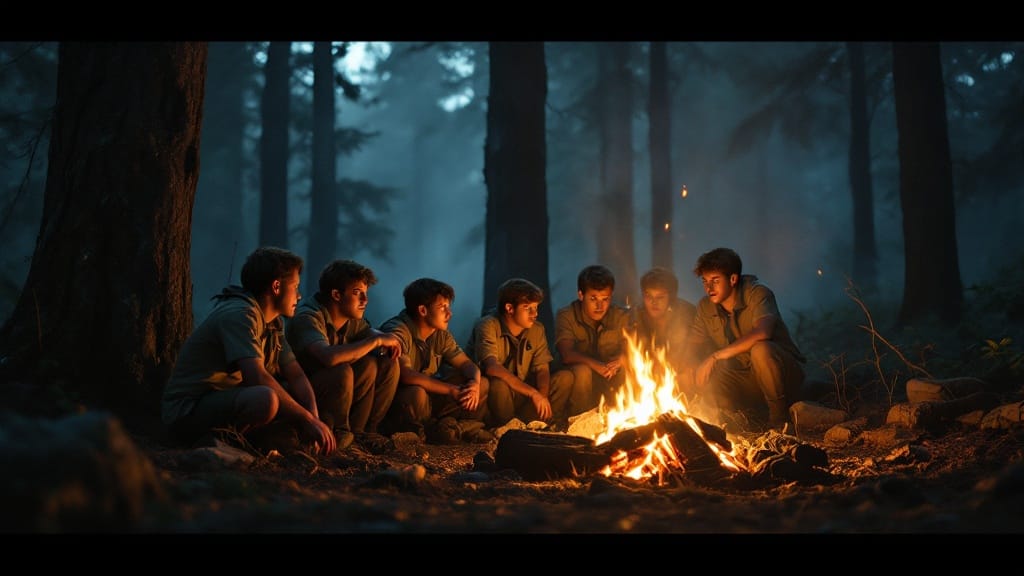Drama
Run Niño Run

Directed by Lance Revoir
Warning – This review contains spoilers.
Run Niño Run is a heartfelt exploration of a father’s struggle to reconnect with his son after the death of his wife. The film centers on Jack, a distant and grizzled father, who must find his runaway son, Emilio, after the boy takes off with the ashes of his late mother. The story builds on themes of family, redemption, and the need for communication in healing broken relationships. I was drawn into the emotional depth of their journey.
The emotional arc of the story is easy to relate to, especially as Jack and Emilio are both navigating their grief in different ways. Jack wants to take Emilio out of the town he believes will lead him into trouble, while Emilio yearns to fulfill his mother’s last wish and stay close to his roots. Their conflict reaches a climax when Emilio runs off with his mother’s ashes, forcing Jack to confront not only his son but also his own failures as a father. Despite the compelling premise, the film relies heavily on expository dialogue rather than showing us the depth of their relationship through actions. While the father speaks of danger and the son’s love for cooking, we don’t see enough of these elements visualized, which would have made their motivations feel more grounded. The story is touching, but it doesn’t introduce anything new to the genre of family reconciliation.
Director Lance Revoir’s personal connection to the story shines through in the film’s dedication to themes of parenthood, redemption, and mixed-race family dynamics. His passion for the project is evident, particularly in the way bilingualism is woven into the narrative.
Focusing strictly on the technical, Run Niño Run had both strengths and weaknesses. The natural lighting worked well for the outdoor scenes, giving the film an authentic, grounded feel, but at times the highlights were overexposed, especially in brighter scenes. The decision to transition from black-and-white to color during the flashbacks added an emotional layer, effectively representing the distance between Jack and Emilio. However the editing felt disjointed at times, especially in the final scene where the emotional weight of the reconciliation between father and son could have been stronger. The film also relied too much on dialogue, missing opportunities to let the visuals speak for themselves.
The cinematography beautifully captures the expansive natural landscapes, but I found that this sometimes clashed with the film’s tone. The film speaks of danger and urgency, yet the serene, picturesque settings didn’t align with the father’s concern for his son’s safety. However the musical score was on point. The lyrical guitar soundtrack imbued scenes with just the right amount of sadness and introspection, amplifying the emotional undertones of the story.
The performances by Dick Schaefer as Jack and Zeka Nichols as Emilio were solid, though at times their delivery felt stiff, and the dialogue sounded rehearsed rather than fully lived-in. The emotional connection between the characters came through, but there were moments where I wished for more subtlety and depth in their performances, particularly during the pivotal final moments of reconciliation.
Overall, Run Niño Run tells a relatable and touching story about a father and son trying to heal from loss, but its execution falls a bit short in delivering the emotional weight it promises. The film’s technical elements elevate certain aspects of the story, particularly through its use of music and natural lighting, but it could have benefited from a more cohesive blend of dialogue and visuals. Ultimately the core themes of family, reconciliation, and redemption will likely resonate with audiences who enjoy family dramas.
Run Niño Run offers an earnest look at the complexities of father-son relationships and the process of healing from grief. While the film doesn’t break new ground, its personal touch and strong musical score lend it authenticity, making it a touching watch for those who enjoy family dramas. The themes of reconciliation and redemption are universal so Run Niño Run leaves a lasting impression.
Comedy
Troop 458

WARNING! This review contains SPOILERS!
Troop 458, written by Trevor Allen, captures the often daunting, yet transformative, experience of being the new kid in a world full of unknowns. We follow Sidney, an anxious boy thrown into his first Boy Scouts campout, where he faces both the perils of acceptance and the strangeness of his eccentric scout leader. As spooky campfire tales start to weave into reality, Sidney is forced to confront his fears head-on, finding moments of humor, adventure, and unexpected camaraderie along the way.
I like the concept of Troop 458 because it blends coming-of-age themes with a playful sense of adventure, all wrapped in an atmosphere tinged with just the right amount of mystery. Allen’s writing brings to life a cast of memorable characters, especially through Sidney’s journey of growth. The tension between humor and fear feels authentic to the Boy Scouts’ setting, and it captures the real challenges kids face when trying to fit in.
What resonated with me most was the screenplay’s exploration of courage—not just in facing mythical dangers but in embracing who you are, quirks and all. Some aspects could benefit from a clearer focus on character motivations and tighter pacing to keep the momentum strong, particularly during scenes that blur the line between myth and reality.
The dialogue is great in many places, offering humor that feels natural for a group of young scouts. There were moments where I felt the conversations could be a bit sharper or more distinct to heighten the comedic or emotional impact. Character development is a strong suit, with Sidney’s evolution being both relatable and satisfying, but secondary characters could have a bit more depth to elevate the ensemble.
Allen’s Troop 458 is polished, with solid grammar, spelling, and formatting that adhere to professional standards. The structure is clean and makes for an easy read, setting up scenes that are visually compelling.
Troop 458 delivers an enjoyable mix of humor, heart, and a touch of the supernatural, leaving me eager to see how it might come to life on screen.
Drama
Ellie

WARNING! This review contains SPOILERS!
Directed by Marcus Mejia
Ellie is a refreshing experience that pulled me right into the world of a young, shy man navigating a work meeting while secretly yearning for a bit of magic in his everyday life. We’re taken through his imaginative, musical daydream—a beautiful escape from reality that reveals his true desires. I loved how the film peeled back layers of his personality without a single word of dialogue. Instead, the music carried the narrative, and surprisingly, it worked so well.
Marcus Mejia did an excellent job blending dramedy elements to keep the film engaging. The moments of humor and more emotional beats make the film feel well-rounded. Mejia’s choice to swap dialogue for music was a bold move, and it paid off. I could feel the character’s internal struggles and hopes as the music brought out emotions words couldn’t.
The lighting felt intimate, almost like it was giving us a window into the protagonist’s soul, and the cinematography perfectly captured the whimsical tone of his daydreams. I noticed how smoothly the editing transitioned between reality and fantasy, which made the story’s pacing feel just right. The sound design was on point, with every beat of music syncing beautifully with the character’s emotional highs and lows.
I loved when the protagonist’s daydream overlapped with reality, creating this seamless blend that felt so relatable. I admired how it portrayed the quiet, unspoken dreams we all carry. It was a reminder of the power of our inner worlds and how much magic lies just beneath the surface of our everyday lives.
Ellie left a gentle yet lasting impression. It’s a unique, heartfelt short film that shows how creative risks can pay off. Ellie is a memorable journey that’s definitely worth the watch.
Drama
Finding Acceptance

Directed by Andrew DeBennett
WARNING! This review contains spoilers.
Watching “Finding Acceptance” was an experience that brought me back to those anti-bullying films we’d see in school assemblies. The story follows Mary, a new student in a wheelchair, navigating the often-tough world of school friendships. Initially, she faces teasing from her peers but finds a genuine friend in Liz, who even manages to extend kindness to Mary’s bully, Max. The message is straightforward and clear: acceptance and empathy matter.
I could see what the director was aiming for—Andrew DeBennett notes that the film was both a joy to create and a personal project. The heart of the story shines through, with Kaylah Pollock (Mary) and Laney Hansen (Liz) bringing warmth to their roles. Their connection feels genuine, even if the overall story feels a bit too familiar.
Technically, the film could have used some fine-tuning. The sound mix was rough, with the music often drowning out dialogue. The editing also felt choppy, making it harder to stay immersed in the story. The dialogue leaned into clichés—phrases like “loser” felt outdated and took away from the realism. The cinematography, however, was a bright spot, creating a warm, inviting feel that suited the film’s positive message.
I felt like the story could’ve benefited from more depth. The bullying that Mary faces is minimal, making her eventual friendships feel somewhat predictable. For younger audiences, this simplicity might be engaging and easy to digest, but it misses the chance to delve into the more complex aspects of acceptance.
In the end, “Finding Acceptance” delivers a positive, albeit simple, message. While it didn’t connect with me on a deeper level, I can see it being a useful film for educational settings, especially for younger viewers learning about kindness and friendship.










